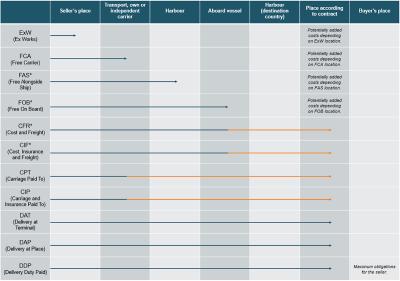Brexit and the Incoterms: Reviewing your contracts
With a new Brexit deadline set for 31 October 2019 and a no-deal Brexit a possible scenario, EU-based buyers and sellers should be aware of their choice of Incoterms used in their contracts with UK counterparties. This article seeks to analyse the usage of various Incoterms from an exporter's perspective and to better prepare sellers for the potential pit-falls.
BACKGROUND
The ICC Incoterms are widely recognised and used by sellers and buyers worldwide. In light of Brexit, EU-based sellers may, however, want to take an extra look at the Incoterm clauses chosen in their contracts with UK-based buyers in prepa-ration of Brexit.
A no-deal Brexit will entail the UK's departure from the EU Customs Union and the establishment of customs borders between the UK and the EU in accordance with WTO regulation. As most know, some Incoterm clauses are particularly seller-friendly regardless of the circumstances, whereas others impose a duty upon the seller to pay import tariffs and customs. As current contracts between EU-based sellers and UK-based buyers have been drafted pre-Brexit, the burden of import tariffs and customs has likely not been considered and can therefore impose substantial additional costs upon one or both parties after Brexit.
The purpose of this short article is to highlight some of the considerations that should be made.
CHOOSING THE RIGHT INCOTERM CLAUSE
When determining which Incoterm clause to choose, in particular two aspects should be considered:
a. In which country is the designated delivery place located (the UK or the EU 27), and
b. Which costs and which risks should be attributable to each party?
Designated delivery place
The designated delivery place must initially be considered, because the location may, for some Incoterm clauses, signifi-cantly affect which party is obligated to cover the costs related to tariffs and customs.
For example, FCA (Free Carrier) implies that the seller must deliver the goods to the first independent carrier at a given place determined in the contract.
If the parties have agreed "FCA Esbjerg", then the seller will be obligated to deliver the goods to Esbjerg but will have no further responsibility apart from providing an export declaration to ensure that the goods can (lawfully) leave the country. This does not in itself impose any other responsibilities upon the seller, for instance the payment of tariffs. For a Danish seller, this scenario would greatly resemble a national sale of goods, since the only noticeable difference would be the need to supply an export declaration.
If the parties had instead agreed "FCA Birmingham", then the same seller would instead bear the risk up until the delivery of the goods in Birmingham. Post-Brexit, the difference between "FCA Esbjerg" and "FCA Birmingham" will entail the seller's payment of export and import tariffs when crossing the national and the English borders, respectively.
Therefore, not only the chosen Incoterms rule needs to be examined from a post-Brexit point of view, but also the chosen delivery place.
The ICC Incoterms
The ICC Incoterms currently comprise eleven different terms which the parties can choose from. The clauses can be said to range from being seller-friendly to being buyer-friendly with differing cost allocations and different points in time for the passing of risk from one party to the other.
On one side we find the more seller-friendly clauses. For example, the ExW clause (Ex Works), merely requires the seller to place the goods at the seller's own premises for the buyer to pick up. ExW entails that the risk passes to the buyer al-ready when the goods have been made available at the seller's premises, regardless of when the buyer actually picks them up. This is the most cost-efficient Incoterm for a seller, simply due to the fact that (i) the passing of risk takes place early in the process and (ii) no further financial responsibilities are imposed upon the seller.
On the other side of the range we find for example the DDP clause. The DDP (Delivery Duty Paid) clause implies that the seller bears the risk and financial consequences up until the point in time when the goods have been delivered in the country of the recipient, and - as the name suggests - with all duties and tariffs already paid. This goes beyond the above mentioned FCA clause (and similar clauses) where the exporter simply needs only to ensure that the goods are fit for the purpose of exportation at the agreed destination, including to provide an export declaration.
The ICC Incoterms thereby regulate both the costs associated with the delivery and the passing of risk.
The following table presents an overview of the ICC Incoterms, including the points in time when the seller is no longer obligated to bear the costs of the delivery and when the risk passes to the buyer. The blue arrow shows the point in time until which the seller bears all costs, including insurance, customs and duties (where relevant) and the risk. The orange arrow indicates the point in time when the risk passes to the buyer but the seller continues to bear the costs.
Click to view the table in full size

*Only available for sea/inland water transport
An advantageous pre-Brexit deal can quickly turn into a less opportune post-Brexit deal. It is therefore important that sellers re-examine their contracts and consider whether (a) the chosen place of delivery (where applicable) and (b) the chosen ICC Incoterm clause will still be commercially viable post-Brexit.
Contact


